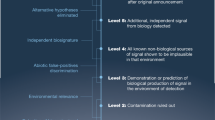Play all audios:

ABSTRACT IN your interesting article on “The New Century” in the January 3 number of NATURE, I notice that you endorse M. Lévy's account of the usefulness of “useless” studies and even
proceed to suggest that “all our progress has come from the study of what was useless at the time it was studied.” Now while fully agreeing with your main argument, it seems to me that this
goes too far. Certainly M. Lévy's illustrations do not prove it. For it so happens that the early astronomical observations, to which he appeals, so far from being useless in the eyes
of those who made them, were believed to be of the utmost practical importance. In fact, it may be doubted whether the study of astronomy has ever again been prosecuted in so directly
utilitarian a spirit as in its infancy. For, quite apart from the practical need of determining the succession of the seasons, which M. Lévy seems to have strangely overlooked, it was
generally believed that the observation of the heavenly bodies was “useful” as a method of forecasting terrestrial events. Astronomy was the offspring of astrology, and assiduously practised
because no distinction had yet been made between those heavenly bodies which made great practical differences to human affairs, like the sun and the moon, and those whose influence was
inappreciable. Furthermore, it must be remembered that these same bodies were regarded as literally deities of the highest order, so that their observation was a religious rather than a
scientific act. This veneration of the heavenly bodies, moreover, persists throughout Greek science, and even Aristotle regards them as composed of a purer and diviner material than anything
“sublunary.” So that, when he advocates the “useless” θεωρία of astronomy and mathematics as the highest exercise of human faculty, he does _not_ mean “seek knowledge for its own sake,” but
rather “raise yourself to the contemplation of what is nobler and diviner than anything earthly.” For the eternal and immutable truths of mathematics also were regarded as being of more
than human validity. Hence it seems a mistake to call these primitive researches useless because we do not happen to believe in the use they were supposed to have. Access through your
institution Buy or subscribe This is a preview of subscription content, access via your institution ACCESS OPTIONS Access through your institution Subscribe to this journal Receive 51 print
issues and online access $199.00 per year only $3.90 per issue Learn more Buy this article * Purchase on SpringerLink * Instant access to full article PDF Buy now Prices may be subject to
local taxes which are calculated during checkout ADDITIONAL ACCESS OPTIONS: * Log in * Learn about institutional subscriptions * Read our FAQs * Contact customer support SIMILAR CONTENT
BEING VIEWED BY OTHERS CALL FOR A FRAMEWORK FOR REPORTING EVIDENCE FOR LIFE BEYOND EARTH Article 27 October 2021 COMBINING DATA AND THEORY FOR DERIVABLE SCIENTIFIC DISCOVERY WITH
AI-DESCARTES Article Open access 12 April 2023 EVOLVING SCIENTIFIC DISCOVERY BY UNIFYING DATA AND BACKGROUND KNOWLEDGE WITH AI HILBERT Article Open access 14 July 2024 AUTHOR INFORMATION
AUTHORS AND AFFILIATIONS * Corpus Christi College, Oxford F. C. S. SCHILLER Authors * F. C. S. SCHILLER View author publications You can also search for this author inPubMed Google Scholar
RIGHTS AND PERMISSIONS Reprints and permissions ABOUT THIS ARTICLE CITE THIS ARTICLE SCHILLER, F. The “Usefulness” of Science. _Nature_ 63, 298–299 (1901). https://doi.org/10.1038/063298e0
Download citation * Issue Date: 24 January 1901 * DOI: https://doi.org/10.1038/063298e0 SHARE THIS ARTICLE Anyone you share the following link with will be able to read this content: Get
shareable link Sorry, a shareable link is not currently available for this article. Copy to clipboard Provided by the Springer Nature SharedIt content-sharing initiative
